Updated 2024-09-17 at 09:52 DM
Online material, reading, assignment and mandatory seminar
Your time planning for week 3
The course runs full time 100% 40 hours per week during 20 weeks during the autumn semester. You are responsible for your own time planning, study time, and that time will be different for different people with different study techniques, experience and pre-knowledge of issues in the course. A rough estimate of the 40 hours you have allocated for the course during week 3 are:
- Online material, videos, audio, texts, activities: 10 hours
- Course books and your own reading: 18 hours
- Seminar assignment: 8 hours
- Mandatory seminar: 2 hours
- Summarizing the week Friday after seminar: 2 hours
Course books and reading week 3
During week 3 you read the following chapters, books:
 Chapter 7-9. Tamm J. W. (2020). Radical Collaboration: Five Essential Skills to Overcome Defensiveness and Build Successful Relationships (2nd ed.). London, UK: HarperCollins Publishers.
Chapter 7-9. Tamm J. W. (2020). Radical Collaboration: Five Essential Skills to Overcome Defensiveness and Build Successful Relationships (2nd ed.). London, UK: HarperCollins Publishers.
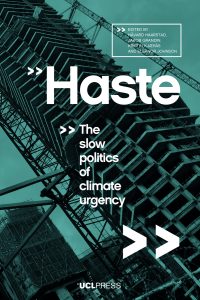 Chapter 6-9. Haarstad, H., Grandin, J., Kjærås, K. & Johnson, E. (eds.) (2023). Haste: the slow politics of climate urgency. London, UK: UCL Press. Free access here: https://discovery.ucl.ac.uk/id/eprint/10162046/1/Haste.pdf
Chapter 6-9. Haarstad, H., Grandin, J., Kjærås, K. & Johnson, E. (eds.) (2023). Haste: the slow politics of climate urgency. London, UK: UCL Press. Free access here: https://discovery.ucl.ac.uk/id/eprint/10162046/1/Haste.pdf
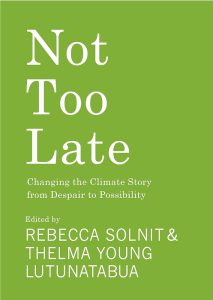 Pages 45-104. Solnit, R. & Lutunatabua, T.Y. (eds.) (2023). Not too late: changing the climate story from despair to possibility. Chicago, Illinois: Haymarket Books.
Pages 45-104. Solnit, R. & Lutunatabua, T.Y. (eds.) (2023). Not too late: changing the climate story from despair to possibility. Chicago, Illinois: Haymarket Books.
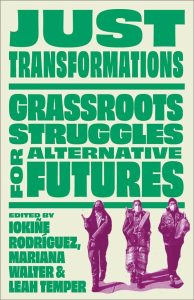 Chapter 1-5. Rodríguez, I. (2023). Just Transformations: Grassroots Struggles for Alternative Futures. London, UK: Pluto Press.
Chapter 1-5. Rodríguez, I. (2023). Just Transformations: Grassroots Struggles for Alternative Futures. London, UK: Pluto Press.
Course goals examined week 3
The course goals that are examined during week 3 are:
On completion of the course, the student should be able to:
- describe climate change and leadership from a justice, power and gender perspective;
- design a practical specialisation within the climate change leadership field;
Syllabus for Climate Change Leadership in Practice.
Written preparation assignment week 3
Your assignment in preparation for this Friday’s mandatory seminar is divided into two parts, one focused on power, justice, gender perspectives and the other part focused on your practical specialization.
Part 1: Power, justice, gender perspectives
At the web page Climate Central – Coastal Risk Screening Tool – Comparison: long-term sea level outcomes you can see what different emissions scenarios looks like in sea level rise for different cities worldwide. Find additional tools and read more about sea level rise here: Surging Seas: Sea level rise analysis by Climate Central. And at Explore Climate Anomalies, Variability, and Uncertainty in Space and Time with the Climate Inspector you can see how different emission scenarios affect temperature rise and precipitation change. Read background article here: Visualizing the Climate’s Future.
- Applying a power, justice and/or gender perspectives, how will the place where you live and places you care about be affected by sea level rise, temperature rises and precipitation change? How will other people, animals and ecosystems be affected? Remember to use relevant references. Max 600 words.
Part 2: Practical specialization
- Starting with the videos in the “Design a practical specialization within the field” section on this page and examples of specializations from previous years here: https://uppsala.box.com/s/fy6wq83p618iv2hcq75rln8ark4n3p0z decide on one or max two topics, issues, thematic areas that you want work on after the first four intensive weeks. Summarize this as a headline, short summary or research question and then add at least one inspirational or informative video, text, book, interview or artistic work to your specialization area. From submitted material I will create a resource page for week 4 so you can see what other will be working on.
Submit the assignment part 1 and 2 no later than September 20 at 12.00 here: https://uppsala.instructure.com/courses/94667/assignments/280811
Mandatory seminar week 3 – Friday September 20 at 13.15-15.00
Join Zoom-meeting here: https://uu-se.zoom.us/j/66235378067
For this week’s seminar we will focus on the two parts of the assignment.
- Indivual reflection and in smaller groups: Why does power, justice and gender perspectives matter for climate and leadership?
- Presentation in smaller group of your tentative practical specialization and constructive feedback.
- Reflections, questions and week 4.
See you this afternoon!
Tech and communication
To be able to study the course you will need a computer, tablet or smartphone with access to the internet. Seminars, workshop and online meetings will be easier if you have external headphones with a microphone. It’s important that you download Zoom here: https://www.uu.se/en/students/it-for-students/software/zoom and install it on the device you’re using for the course. You can test video and audio in the settings.
You can ask general questions at the end of mandatory sessions online, and course coordinator Daniel Mossberg is available every week day Monday to Friday via text/sms 073-065 02 28, call if there’s anything urgent. Emails will be responded to within one week at daniel.mossberg[a]cemus.uu.se.
Online material – video, audio, texts and activities
Power perspectives on climate and leadership
Justice perspectives on climate and leadership
Gender perspectives on climate and leadership
Design a practical specialization within the field
The videos in this section are listed as examples and inspiration for your practical specialization
Food waste Uppsala
Campus Garden
Permaculture design
Slow food
Transition towns
Doughnut cities
Climate municipalities
Walter Seagal self-build
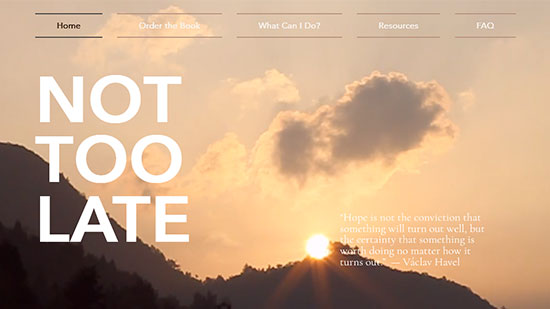
Radical Collaboration resource page – click for web page
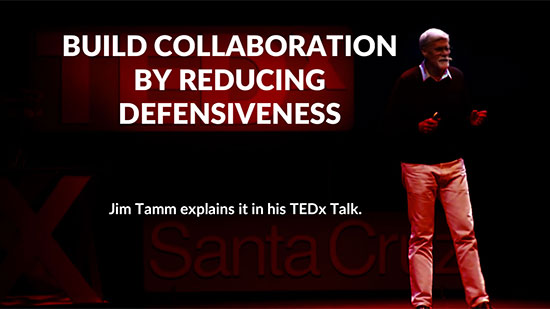
Upcycling beyond recycling
Business models
Citizens’ assemblies
Climate emotions
Art and philosophy
Providing meals in crisis
Aid organisations in war
Okay, now trip number 17 is over, the largest convoy we've made so far. With no fewer than 13 trucks and pickups, we left our base in Sweden to deliver electric power to various parts of Ukraine. This time, we headed to both a university in Kyiv (last in video) and a somewhat… pic.twitter.com/Md2fS2cY8o
— PowerUpUkraine (@PowerUpUkraine) September 10, 2024
Documentary of the week
Direct link here: https://youtu.be/RibAQHeDia8
